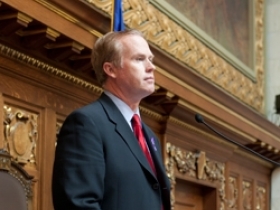Fitzgerald’s Strangely Sleepy Campaign
Is Jeff Fitzgerald running for U.S. Senator or top lobbyist?
In a race where Republicans Tommy Thompson, Mark Neumann and Eric Hovde have taken turns bashing each other, uber-conserative Fitzgerald has played the role of peacemaker, joke teller and all-around nice guy.
“Assembly Speaker Jeff Fitzgerald makes light of his low standing in the polls in the race for U.S. Senate,” a profile in the Milwaukee Journal Sentinel leads off. “He jokes about his anemic fundraising reports.”
But as one Republican insider put it, “This isn’t a real campaign by Fitzgerald. He’s running to build up his name recognition so he can become a lobbyist. He’s stepping down from the legislature to make the big money.”
Of course, if you want lobbying work, you’d be well advised not to antagonize any of your Republican opponents or their followers. You want every legislator to be thinking nice thoughts when you stop by to buttonhole them.
“Jeff Fitzgerald is not a serious candidate for U.S. Senate,” as a “Downstate Democrat” commented in a Daily Kos article.
No Republican, however, has been willing to say this on the record. The closest I’ve seen is the Sunday column by Republican insider Christian Schneider, who wryly described the candidate as “Jeff Fitzgerald of Fitzwalkerstan, who may or not still be actually running a campaign… he appears to be running a stealth campaign cloaked in invisibility; it is entirely possible that Fitzgerald could be elected, only for people to realize he left the country six months ago to bartend at a cocktail stand on a Caribbean beach.”
The irony of the situation is that Fitzgerald might have had a fighting chance. He could have followed the script of Russ Feingold in 1992, a dark horse candidate who smartly stayed out of the fray as Democratic frontrunners Jim Moody and Joe Checota attacked each other. Feingold eventually won the primary and the general election for U.S. Senator, after a memorable campaign with funny ads showing he knew the state “like the back of his hand.”
Fitzgerald, by contrast, has made little effort to raise money, has no notable ads or ringing slogans, and seems to be coasting through the entire campaign. As Schneider puts it, “if the other armies eviscerate each other, Fitzgerald could stroll to the throne, martini shaker in hand.”
More on We Energies
White makes a valid point, and I was remiss in not including that as a key factor in the rate hikes by We Energies. On the other hand, that is the beauty of running a publicly regulated monopoly. Whenever you do expand, you get to increase your rates to pay for it. There’s none of the risk a company competing with others faces, so why is We Energies allowed such a lovely profit margin and such high pay for its executives? In Forbes most recent run-down of the 500 top-paid executives, Klappa’s lordly compensation of $17.27 million ranked him 81st in the country. This for a public utility in a medium-sized metro area? That’s remarkable.
As to why the Journal Sentinel soft-pedals its coverage of the company, it may simply be a reluctance to take on local businesses. On other hand, it might not hurt that Baird executive Mary Ellen Stanek sits on the corporate boards of both Journal Communications Inc. and We Energies.
Paul Ryan, Rock Star
The latest issue of New Yorker magazine offers a feature story portraying Wisconsin Congressman Paul Ryan as the most important thinker in his party: “To envisage what Republicans would do if they win in November,” Ryan Lizza writes, “the person to understand is not necessarily Romney, who has been a policy cipher all his public life. The person to understand is Paul Ryan.”
It’s a fairly sympathetic portrait that ignores the fierce and quite detailed critiques of Ryan’s policies by Nobel Prize-winning economist Paul Krugman. Nor is it long on surprises, but it’s a good read with at least a couple catchy items, to wit:
-“Like many young conservatives, (Ryan) is embarrassed by the Bush years.”
-“He joined nearly every (high) school club: Latin Club, History Club, the Letterman’s Club, for varsity athletes, and the International Geographic Society…. At the end of his senior year, he was elected Biggest Brown-Noser.”
-Quoting conservative columnist Charles Krauthammer on the impolitic nature of Ryan’s budget road map: “a recklessly bold, 73-page, 10-year budget plan…At 37 footnotes, it might be the most annotated suicide note in history.”
Scott Walker’s Hubris
Last week, Gov. Walker gave a speech at Harvard University where he claimed the state has made more education reforms in the last 18 months than in the last 18 years. It was a wildly misleading claim.
This, after all, is state that prior to Walker’s election had gone through revolutionary changes in education, broadening a new school choice program to include religious school choice, creating several kinds of charter schools and virtual schools, adding open enrollment, switching from standardized state tests to proficiency-based tests, and seeing a huge increase in the number of students taking Advanced Placement classes and tests. These are just the top-of-mind changes over the last 18 years.
And Walker’s reforms? Actually, his speech offered little detail on the education improvements he’s undertaken. On this subject, his speech deserved, at best, a grade of incomplete.






















Today’s story (MJS) about increased WE earnings attributed part of the gain to a share buyback program. Was this done to benefit insiders and large shareholders, a back door method of throwing off cash instead of a dividend payment, or something entirely different ?